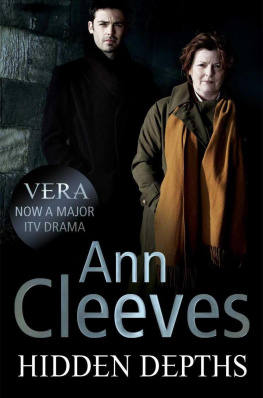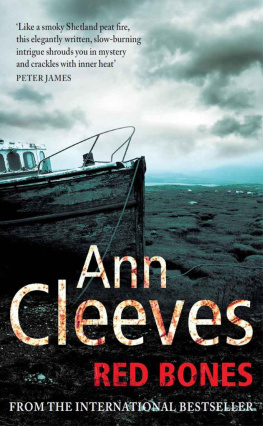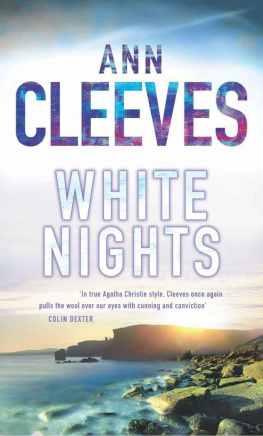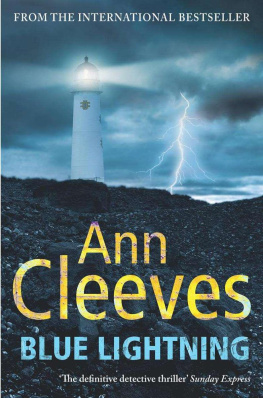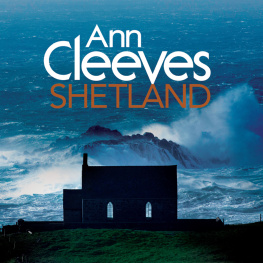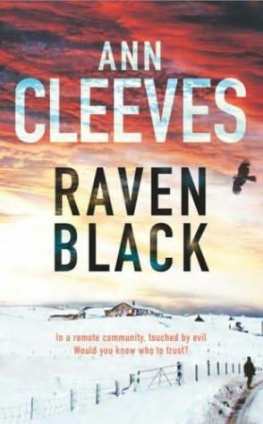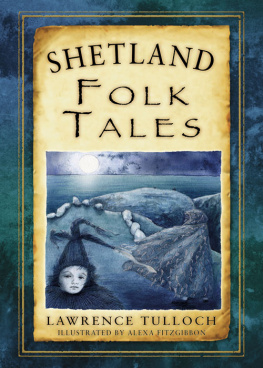
The fifth book in the Shetland series, 2013
For Ben Clarke and Isla Raynor
Jimmy Perez stopped for breath and looked out to sea. A still, calm day, the light filtered through high cloud so that the water was shiny grey, like metal. On the horizon a bank of fog. In the deep pockets of the long oilskin coat that had once belonged to his grandfather were pebbles the size of eggs. They were round and smooth, and so heavy that he could feel the weight of them pulling on his shoulders. Hed collected the rocks from the beach at Ravenswick, selecting them carefully: only the roundest, the ones that were white as bone. In the distance, a little way out from the shore, there was a stack of rock shaped like a rough cross, tilted on its side. The calm water hardly broke around it.
Perez started walking again, counting out the paces in his head. Most days since Frans death he performed the same ritual: collecting the pebbles from the shore close to her house and bringing them here, to her favourite place in the islands. Part penance and part pilgrimage. Part mad obsession. He rubbed the pebbles with his thumb and found a strange comfort in the touch.
On the hill there were ewes with young lambs, still unsteady on their feet. This far north lambing came late and they didnt arrive until April. New life. The bank of fog was rolling closer, but in the distance, on the highest point of the headland, he could see the cairn hed built with his collection of Ravenswick stone. A memorial to the woman whom hed loved and whose death still weighed on his conscience, pulling him down.
As he walked he recalled the stages of their relationship, the seasons of their passion. This too was a ritual performed on every visit. Hed met her in winter, with snow on the ground and hungry ravens tumbling in a frozen sky. Hed made love to her in midsummer, when the cliffs were raucous with seabirds and there was a carpet of wildflowers in the meadow below her house. In early spring shed proposed marriage to him. He stopped for a moment, dizzy with the memory of it, and the sky seemed to tip and wheel around his head, and he couldnt tell where the sea ended and the sky began. Her challenging smile. Well, Jimmy? What do you think? And shed died in the autumn, in a storm that battered his Fair Isle home, sending spindrift high into the air and cutting them off from the outside world.
Im mad, he thought. I will never be sane again.
From the cairn he could see the sweep of the North Mainland. Fran had loved it because she said this summed up Shetland in one view, the bleakness and the beauty, the wealth that came from the sea and the hard, barren land. The past and the future. In the distance, in a fold in the land, the oil terminal at Sullom Voe, in this strange silver light looking almost magic, a lost city. Everywhere land and water, and land reflected in water. To the south the line of giant wind turbines, still now. Below him the settlement of Hvidahus, three toy houses and a pier, and almost hidden by trees the crofting museum at Vatnagarth where hed left his car.
It was six months to the day since Fran had died. He thought he wouldnt come back here until Frans daughter Cassie was old enough to understand. Or he felt up to bringing her. He hoped the cairn would still be there then.
He walked down the hill into the fog. It lay like a pool over the lower ground, swallowing him up, so that he felt as if he were drowning. The museum car park, which had been empty when he arrived, was full now and there was music coming from one of the barns, and the windows were lit square moons penetrating the gloom. The music drew him towards them and he was reminded of the folk tales of his youth, the trowes who seduced mortals with their fiddle-playing and stole a century of their lives. And he must look like something from a story himself, he thought, with his long black hair and his unshaven face, the long black coat. He peered through a window and saw a group of elderly people dancing. He recognized the tune and for a moment was tempted in himself, to take the hand of one of the old women sitting against the wall and spin her round the room, making her feel young again.
But he turned away. The old Jimmy Perez might have done that, especially if Fran was with him. But he was a changed man.
Jerry Markham looked across at the voe that wound inland from the open sea. Behind him was the open hill, peat and heather, brown after a long winter. Ahead of him the oil terminal. Four tugs, big as trawlers, two alongside, one forward and one aft, nudged the Lord Rannoch backwards towards the jetty. The tankers were always moored to face the sea, ready for escape in case of incident. Beyond the still water he saw an industrial scene of oil tanks, office accommodation and the huge bulk of the power station that provided power for the terminal and fed into the Shetland grid. A flare burned off waste gas. The area was surrounded by a high fence topped by razor wire. Since 9/11, even in Shetland, more care had been taken to secure the place. At one time all that was needed to get into the terminal was a laminated pass. Now every contractor was vetted and put through a safety course, and every truck was inspected and badged. Even when the gates were opened, there was a further concrete barrier to block access.
Jerry took a photograph.
Overhead an Eastern Airways plane came in to land at Scatsta Airport. During the war the airstrip had been an RAF station. Now it carried more traffic than Sumburgh, but no scheduled flights landed here; no tourists or kids home from college would climb from the plane. These flights were all oil-related. Markham watched as a group of men climbed onto the runway. Fit men, they could have been members of a rugby team or an army platoon: there was the same sense of camaraderie. The male bonding thing that had somehow passed him by. Markham couldnt hear their voices from where he stood, but he could sense the banter. Soon helicopters would take them to start a new shift on the platforms or the rigs.
Once, more than 800 tankers a year had carried crude oil south from Sullom Voe; now just 200 arrived at the jetty, and the Lord Rannoch carried medium crude from Schiehallion, an Atlantic field to the west. The North Sea fields were almost empty. Markham knew the facts and figures. Hed done his research, but he was Shetland-born and -bred. Hed grown up with the benefits of the oil: the well-equipped schools and the sports centres, the music lessons and the smooth, wide roads. Oil was getting harder and more expensive to extract from under the seabed, but still the site looked busy; there was no sign today that the terminal was in decline. For a moment he wondered if Shetland would have been different if he would have been different and less spoiled, if the oil had never been discovered. And what the future would hold for the islands once the oil had all gone.
Markham shifted position so that he had a slightly different perspective and took another photograph. Beyond the perimeter fence a road was being built. Accommodation modules like steel cans were being set on concrete blocks. A new terminal was being constructed next to the old one, and a huge rectangular wall held the blocks of peat that had been dug from the hill to clear the site. As the oil was running out, gas had been discovered, and Shetland had welcomed the new energy source with enthusiasm. Gas meant jobs. Local trucks were already carrying rocks from Sullom quarry to form the foundations of the plant. Hotels, guest houses and B &Bs were packed with workers from the south. House prices were rising again. Gas meant money.
Next page

